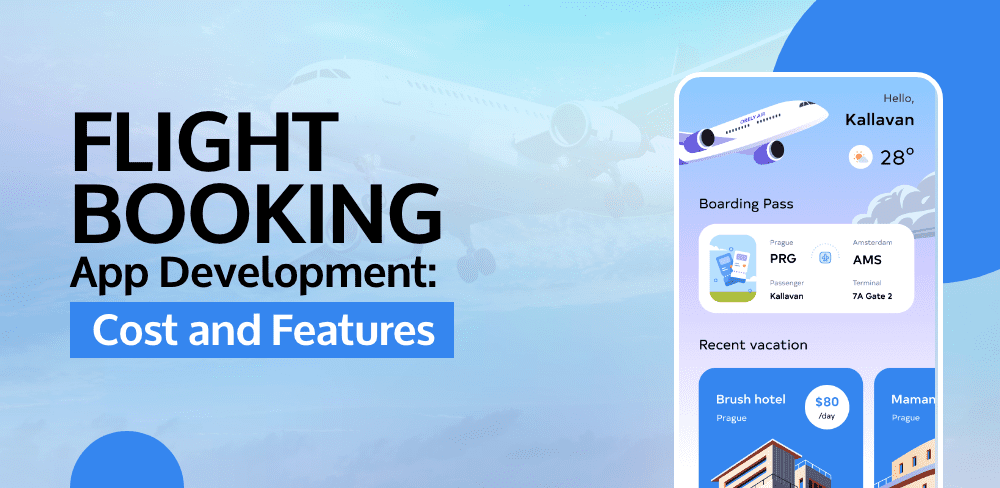“Travel makes one modest. You see what a tiny place you occupy in the world.”
– Gustave Flaubert.
In the fast-paced world of travel, the demand for seamless and efficient flight booking experiences has soared, leading to the rise of innovative Flight Booking Apps. In this blog post, we delve into the dynamic realm of Flight Booking App Development, exploring both the critical features that elevate user experience and the associated costs that businesses need to consider.
As the travel industry undergoes a digital revolution, the significance of a well-crafted flight booking application cannot be overstated. From user-friendly interfaces to real-time updates and secure payment gateways, the features of these apps play a pivotal role in attracting and retaining users.
Whether you’re a tech enthusiast or an entrepreneur eyeing the travel tech space, this exploration promises insights into the evolving landscape of flight booking apps, aiming to empower and inform those ready to take flight in this exciting industry.
What is Flight Booking App Development?
Flight booking app development is the process of developing mobile applications that enable customers to use their smartphones or tablets to search, book, and manage flights. These apps usually integrate with airline databases to provide real time flight information, pricing and availability. Users can search through options, pick preferred flights and make payments. They will also receive booking confirmations. So, if you are planning to invest in flight booking app development, then you must hire mobile app developers.
Statistics of the Online Flight Booking Service Market

- Forecasts predicted that the global revenue for the “Flights” segment of the shared-mobility market would increase continuously between 2023-2027 by 126.8 Billion U.S. Dollars.
- The indicator is expected to reach 702.7 Billion U.S. Dollars in 2027, after seven consecutive years of growth.
- In our survey of U.S. consumers on “Travel Product Online Bookings”, “Hotels” is the most popular answer.
- Booking Holdings will continue to be the largest online travel agency in terms of revenue. All three of the big three experienced revenue growth exceeding 60% last year.
- com had a market share of almost 35% in 2021. Expedia’s share increased, while Airbnb made a slight decline.
- Mobiles are used more for browsing than purchasing, as 55% of online traffic is generated by mobile devices. However, only 44% of that traffic is converted into sales.
Cost of Flight Booking App Development
The cost of flight booking app development can be significant and vary depending on a variety of factors. The features, complexity, and location of the development team all affect the final mobile app development cost. This project has a wide price range, from $10,000 to $25,000
For a simple flight booking app, with basic features and a minimalistic design, you should expect to spend anywhere between $10,000 and $15,000. The cost range you should anticipate is $10,000 to $15,000.
If you choose to develop a more advanced application with features such as itinerary management, push notification, or loyalty program integration, your cost could be anywhere from $16,000 to $25,000.
| App complexity | Cost estimation | Time duration |
| Simple App | $10000-$14000 | 2-4 months |
| Medium App | $16000-$20000 | 5-6 months |
| Complex App | $25000 | 8 months |
It is necessary to consult with a reputable on demand app development company to obtain an accurate cost estimate. They will provide you a precise timeline for the project’s completion in addition to a comprehensive cost estimate.
Factors Affecting The Flight Booking App Development Cost
The process of flight booking app development might be challenging. The price will be influenced by several things. Here are some crucial things to think about:
1. UI/UX Design
Apps that allow users to book flights depend heavily on having a clear UI/UX strategy. To ensure a smooth design, the development team does several tests. User engagement and client retention may rise as a result. The tools used for testing and quality assurance determine how much a flight booking application will cost to construct.
2. Platform Type
Budgets are affected by the platform that is used to develop the app. Budget requirements for iOS, Android and cross-platform applications vary. To optimize your budget, it is best to start with one platform. Switching to a cross platform app once the app has gained traction on the market is recommended. This can minimize the budget requirements while maximizing the app’s reach.
3. Team Size
It’s critical to consider the tradeoffs between cost and quality when deciding on the size of dedicated developers. The cost of creating custom flight booking applications is significantly influenced by the size of the team that develops the app.
While using freelancers for flight booking app development might save money, the quality of your app may suffer due to their inexperience. Outsourcing the project to an agency that specializes in app development can reduce the cost of airline ticket booking apps while also leveraging the years of experience.
4. App Maintenance
In this digitally expanding economy, it is vital that apps are maintained properly to ensure their growth. It is therefore imperative that you take the necessary steps to ensure your app performs optimally and runs smoothly across all platforms. Maintenance costs can creep up after the development phase and include the fees required to upgrade the app or incorporate new technologies as per the market’s requirements.
5. App Type
There are two types of flight booking applications: dedicated and aggregator. The dedicated app is operated and owned by a particular airline, such as IndiGo or Delta. Aggregator apps are not associated with any airline, but instead aggregate and compare flight information from different sources such as online travel agents (OTAs), GDSs, or direct connections to airlines. Dedicated apps may be less expensive to develop, since they only need to integrate data and systems from one airline.
6. Tech Stack
It is important to incorporate modern technologies in flight booking app development to differentiate the app from other travel apps. To gain traction on the market, a robust tech stack combined with a dedicated flight-booking app is essential. The cost of integrating the technologies will vary depending on the time required to implement the technology.
7. Features List
It is crucial to consider the features that will be included in the app for flight booking app development. This directly correlates with its cost. It is important to have a well-defined set of features for a flight booking app in order to differentiate the app and gain traction on the market. App success will be ensured by carefully considering and prioritizing the features that are needed.
Key Features to Integrate in Flight Booking App Development
When creating an app for booking flights, you need to consider several features in order to provide a positive user experience. The app should also meet the needs and expectations of your intended audience. So, it is vital to hire iOS app developers to integrate features in your app for iOS devices. Here are a few of the most crucial features to keep in mind:
1. Flight Search and Booking
You should be able to search for flights easily based on travel dates, destinations and other preferences such as number of passengers and class of service. Booking should be easy, with accurate pricing and availability.
2. Real-time flight tracking
Keep users informed of flight updates in real time, such as delays, cancellations and gate changes. This feature will enhance the user’s overall experience and make travel stress-free.
3. Multiple Payment Options
A variety of payment options, such as credit/debit cards, net banking, electronic wallets, and others, ought to be available to users. To stop fraud and data theft, this functionality needs to be implemented securely.
4. Loyalty Programs
You may want to integrate loyalty programs in your app to increase customer retention. These programs offer frequent users incentives such as discounts or points.
5. Travel Itinerary Management
The feature allows users to plan their trip, including booking flights, hotels, and renting cars. This feature can help users to keep track of their important travel documents such as passports, insurance, and visas.
6. Customer Support
A robust customer service system will ensure users enjoy their experience using your app. Customer support should be available via various channels, such as email, chat, phone or other. It should also be helpful and responsive.
7. User Profile Management
Users can create and manage profiles that include their personal information, preferences for travel, and past bookings. This feature allows users to save valuable time while ensuring a more personal experience.
8. Multilingual Support
Consider adding multilingual support if your app is aimed at a global market. This feature will make your app easier to use for non-native English-speaking users.
9. Push Notifications
Users can stay informed with push notifications about their travel plans, upcoming flights or special offers. Be careful to not overwhelm users with too many alerts.
10. Security
Any app that deals with sensitive financial and personal information should have a high level of security. Be sure your app uses the latest security protocols, and that all user data is kept safe.
Top 5 Flight Booking Apps
There are many flight booking applications on the market to meet the needs of travelers around the world. This section will examine some of the most popular and distinctive flight booking apps.
| Flight Booking Apps | Available Platform | Downloads | Ratings |
| Skyscanner | Android | iOS | 50M+ | 4.7 |
| Expedia | Android | iOS | 50M+ | 4.6 |
| Hopper | Android | iOS | 10M+ | 3.8 |
| MakeMyTrip | Android | iOS | 50M+ | 4.6 |
| EaseMyTrip | Android | iOS | 5M+ | 4.2 |
1. Skyscanner
Skyscanner, a popular flight booking app, allows users to find and book flights with airlines around the globe. Apps may be downloaded from the appropriate app stores for iOS and Android devices. Because of the app’s intuitive layout, users can quickly look for flights with many people, their desired destination, and their preferred travel dates.
2. Expedia
The well-known airline booking application Expedia provides a range of services, such as holiday packages, hotel and vehicle rentals, and flight booking. Users of the app may look up flights by airline, airport, or departure and arrival dates. Additionally, users may get the greatest flights over a variety of dates by using the app’s flexible search date option.
3. Hopper
Hopper, a travel booking site that uses artificial intelligence, estimates ticket prices and suggests when to book flights. The flexible date search allows users to find the best flights across different dates. The “Watch This Trip’ function on Hopper allows users to keep an eye on the price of flights and get updates whenever the price drops.
4. MakeMyTrip
You can book everything in one app, including flights, hotels and other travel services such as buses, trains, taxis, and vacation packages. You can compare prices, read reviews and get access to exclusive discounts and deals. MakeMyTrip, India’s most popular and trusted travel app1, is available for Android devices.
5. EaseMyTrip
The app offers the lowest fares, no convenience fees and free cancellation. The app allows you to book hotels, buses and cabs as well as holiday packages. EaseMyTrip has become one of India’s fastest-growing travel applications.
How to Reduce the Cost of Flight Booking App Development?
For businesses looking to develop an application that is cost-effective, but also efficient, reducing the cost of app development for flight bookings is essential. Here are five tips to minimize your development expenses. However, you can avail the Flight app development solutions from a reputed app development company who can build an app in lesser cost:
1. Clear Project Scope and Requirements
Before beginning development, clearly define the scope of the project and its requirements. A clearly defined roadmap will prevent unnecessary features and changes in the development process. This will reduce both costs and development time. Make sure that both the development custom booking app development team as well as the stakeholders understand the app’s functionalities and goals.
2. Select the Right Technology Stack
The cost of development can be significantly impacted by the technology stack you choose. Choose technologies and frameworks which are compatible with your project’s needs, since they can help reduce costs and development time. Consider open-source apps to avoid licensing fees and leverage existing resources.
3. Agile Development Methodology
Agile development can improve efficiency and flexibility. Sprints are a way to break down the development into manageable, smaller iterations. This allows for frequent assessments, adjustments and continuous improvement based on feedback. Agile methodologies encourage collaboration, reduce errors and allow the development team to be responsive to changes in requirements.
4. Outsourcing Development
Outsourcing certain aspects of your development process to countries that have a lower cost-of-living is a good idea. It can save you a lot of money without compromising on the quality. Selecting reputable partners who have a track record of success is important when outsourcing. Outsourcing also allows you to access a larger talent pool and more specialized expertise.
5. Minimum Viable Product Approach
Build a Minimum Viable product (MVP) and prioritize the essential features. An MVP allows you launch the core functionality of your app quickly, collect user feedback and make informed decisions regarding future features. This method not only minimizes development costs, but also reduces the risk that you will invest in untested or unnecessary features.
Conclusion
Online travel booking apps provide a fantastic chance for market expansion. Additionally, it gives people a straightforward method to use a basic online booking tool. The number of excellent features an app has will determine how much it costs to build. Additionally, it integrates client panel and admin functions. To create a flight booking application at a reasonable price, you may hire on demand app developers who have years of expertise in app development.
Frequently Ask Question
1. How long does it take to build a Flight Booking App?
The length of time it takes to develop a flight booking application depends on the complexity of the app. A highly complex flight app development can take up to 9 months. A simple app with minimal features may take 3 to 4 months to develop. To know the exact time estimation, it is advisable to consult with a Flight booking app development company.
2. How to Monetize Flight Booking Apps?
Monetizing flight booking apps can be achieved through various strategies such as commission-based models, premium features, in-app advertising, and partnerships with airlines and hotels. By optimizing user experience and providing value-added services, developers can create revenue streams while ensuring user satisfaction in the competitive realm of travel technology.
3. How Much Does AI-based Flight Booking App Development Cost?
The cost of developing an AI-based flight booking app can range from $10,000 to $30,000, depending on features, complexity, and development time. Factors like AI integration, real-time updates, and personalized user experiences contribute to the overall investment in creating a cutting-edge solution.
4. What Are the Benefits of Creating Flight Booking App Development?
Creating a Flight Booking App offers streamlined access to travel services, enhancing user convenience. It provides real-time updates, secure transactions, and personalized experiences. For businesses, it opens new revenue streams, fosters customer loyalty, and positions them at the forefront of the evolving travel technology landscape.










